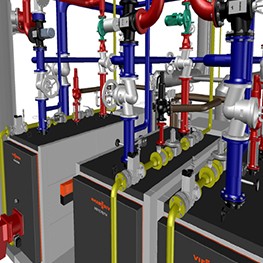Plumbing System Design Training

Are you prepared to embark on a transformative journey that will redefine your expertise in building design systems through Autodesk AutoCAD MEP?
At Nziza Training Academy, we are pleased to introduce a comprehensive course meticulously designed to elevate your proficiency from foundational principles to advanced concepts within AutoCAD MEP.
Are you eager to explore the depths of this powerful software, from its fundamental features to its intricate capabilities in supporting mechanical, electrical, and plumbing (MEP) systems throughout the building lifecycle?
While AutoCAD MEP offers a plethora of possibilities, our course focuses with precision on plumbing and drainage systems design—a cornerstone of building projects, be it residential or commercial.
With our guidance, you will delve deep into this critical aspect of building design, gaining invaluable insights and practical skills to excel in this specialized domain.
Join us in this transformative endeavor and empower yourself with the knowledge and expertise to navigate the complexities of plumbing and drainage design with Autodesk AutoCAD MEP.
Immerse yourself in a comprehensive training program meticulously crafted to empower plumbing and water professionals with a profound understanding of water supply and drainage systems. Our project delivery-focused course is meticulously designed to equip you with the confidence and competence to undertake plumbing projects from inception to completion.
Upon completion of this course, you will gain a comprehensive grasp of key design considerations essential for building plumbing and drainage systems. You will adeptly apply industry codes and standards, make informed decisions regarding materials selection, meticulously choose equipment and corresponding piping, and discern when specialized piping is warranted.
The Plumbing and Drainage Design course encompasses a broad spectrum of topics, ranging from various drainage systems to supply water distribution and hot water systems, all optimized through smart system design and energy conservation principles. Plumbing stands as a cornerstone of building design, facilitating the seamless delivery and utilization of water within a structure. Through our program, you will learn to develop plumbing and piping systems tailored to the unique requirements of each building or construction project.
Here is a glimpse of what you will learn:
Throughout this course, you will delve into a diverse array of topics essential for plumbing and drainage systems design, including:
Plumbing Criteria: Gain insight into the fundamental principles of plumbing design, covering aspects such as economy, reliability, materials selection, construction techniques, and safeguarding critical applications.
Drainage Systems: Explore the intricacies of various drainage systems, encompassing sanitary systems, sumps and sump pumps, interceptors, chemical waste management, backwater valves, food waste grinders, floor drains, stormwater drainage, downspouts, sub-soil drains, P-traps, venting requirements, and combined sanitary and storm drainage systems.
Water Supply Systems: Learn about the criteria for supply water service, water hammer arrestors, booster systems, hydro-pneumatic system guidelines, hot water systems, circulation schemes, water drinking systems, and design considerations for different types of units.
Insulation of Plumbing Systems: Understand the importance of insulation in plumbing systems, including requirements for unfired water storage heaters, electric heaters, recirculated systems, and miscellaneous systems to prevent heat loss and ensure efficient operation.
Fuel Gas Systems: Familiarize yourself with safety precautions for fuel gas systems, including considerations for system pressure, pressure regulator location, seismic considerations, and ventilation requirements to ensure safe and reliable operation.
Energy Conservation: Discover guidelines for implementing eco-friendly and energy-efficient plumbing systems, including strategies for reducing power and water consumption. Topics include pipes protection, low-flow fixtures, dual flush toilet conversion, tankless water heaters, solar water heaters, and low-flow shower heads to promote sustainability and lower utility bills.
Fire Protection Systems: Explore the principles and design considerations for fire protection systems, including fire sprinkler systems, standpipes, fire pumps, and fire suppression systems. Learn about regulatory requirements, system components, and installation guidelines to ensure effective fire safety measures in buildings.
Water Conservation Techniques: Dive into water conservation strategies aimed at reducing water usage and promoting sustainable practices. Explore techniques such as rainwater harvesting, greywater recycling, water-efficient fixtures, and irrigation systems to minimize water waste and preserve this precious resource.
Green Building Standards: Gain an understanding of green building standards and certifications, such as LEED (Leadership in Energy and Environmental Design) and BREEAM (Building Research Establishment Environmental Assessment Method). Learn how to integrate sustainable design principles into plumbing systems to meet green building criteria and enhance environmental performance.
Building Information Modeling (BIM) for Plumbing: Discover the role of Building Information Modeling (BIM) in plumbing design and construction. Explore BIM software tools and methodologies for creating digital models of plumbing systems, coordinating with other building disciplines, and optimizing system performance throughout the project lifecycle.
Who should attend this training:
This training is ideal for a diverse range of professionals involved in the planning, design, construction, and maintenance of plumbing and drainage systems. Specifically, it is suitable for:
Plumbing Engineers and Designers: Professionals responsible for the design and engineering of plumbing systems in buildings, including residential, commercial, and industrial facilities.
Water Resource Engineers: Individuals involved in the management and conservation of water resources, including the design and implementation of sustainable water supply and drainage solutions.
Building Contractors and Project Managers: Construction professionals tasked with overseeing the installation and integration of plumbing and drainage systems within building projects.
Facility Managers and Maintenance Technicians: Personnel responsible for the operation, maintenance, and troubleshooting of plumbing and drainage systems in existing buildings and facilities.
Architects and Building Designers: Professionals involved in the architectural design process, seeking to gain a deeper understanding of plumbing and drainage system integration within building designs.
Environmental Engineers: Individuals focused on environmental sustainability and green building practices, interested in incorporating water conservation and efficiency measures into building designs.
Regulatory Authorities and Inspectors: Officials responsible for enforcing building codes and regulations related to plumbing and drainage systems, seeking to enhance their knowledge and expertise in the field.
Students and Academics: Those studying or teaching in fields related to civil engineering, environmental engineering, architecture, or construction management, looking to expand their knowledge and practical skills in plumbing and drainage systems design.
Regardless of your specific role or background, if you are involved in any aspect of plumbing and drainage systems design, installation, or management, this training will provide valuable insights and practical skills to enhance your professional capabilities.
